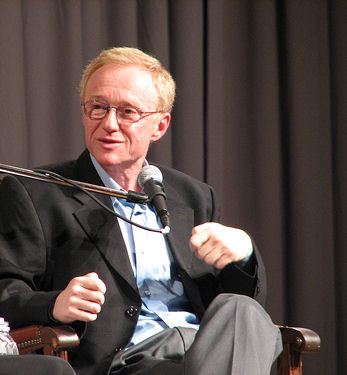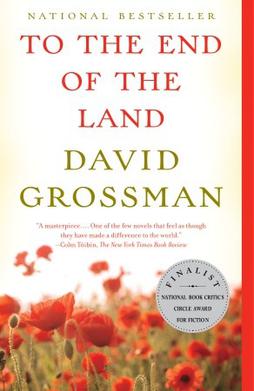"Israel is a hard place to live, but a paradise for writers," says David Grossman.
I am listening to him in the Salon Juan Rulfo at the Feria Internacional del Libro because two months before, an Oregon friend emailed me about the Israeli writer's novel To the End of the Land [In Hebrew, its title means A Woman Flees from a Letter]. The following week, I find the book at the San Miguel library an hour's bus ride down the road. I am the fourteenth reader to check it out.
The novel in English translation is over 600 pages, but when I finish, I can't put it down, partly to pick up some details I had missed, but mainly because I can't bear to leave Ora, Abram, Ilan, Ofer, Adam and Sami.
By chance I learn that Grossman is to be a featured speaker at the International Book Fair this month in Guadalajara, four hours from where I live, This time, I travel four hours by bus each way.
At the formal opening,Grossman and Nobel prizewinner Mario Vargas Llosa share the stage, talking about the importance of writing in their lives and for the world.
The next morning I arrive for Grossman's press conference after rushing across the city to get to Expo Guadalajara by nine in the morning. Breakfast can wait. Only a dozen people are there, including the press attache from the Israeli embassy. I can hardly believe it. I had imagined at least a hundred would fill the room, even at the early hour.
Fifteen minutes later, when Grossman comes in, trim in his open collared shirt and loose jacket, the press conference begins. Without the usual introduction, the interpreter brusquely asks the press for questions.
Silence.
Looking down at the two I have written down in advance, I raise my hand in a hurry. I am about to learn the drawbacks of being first in line. I ask Grossman : What does he think is the future of Hebrew fiction in Israel and abroad? Afterward, besides the literary arts of reading and writing, what other arts are part of his life?
The writer's answers are stiff compared with his later replies. Besides, I needn't have worried about upholding the honor of my adopted country, two dozen journalists full of questions troupe in later.
But Grossman's way of responding reveals more about the author than I am expecting. He keeps the questions in mind, remembering to circle back to talk about the six generations of Israeli writers including the youngest wave of Israeli novelists. Without singling any of them out, he mentions that many of them are presenting at the Book Fair. Clearly Grossman is determined to educate the people of the Spanish speaking world about his own country, the land he says will always be his home.
He explains that he writes all day, every day in a basement room. He goes to the theater and, when he has time "the cinema." He takes time to add that Israeli movies are getting better, winning prizes. Whether a book takes him one year or five, when he finishes "I feel I am coming out of a bubble."
Like the older writers Amos Oz and A.B.Yehoshua, Grossman has been an outspoken advocate for peace between Israel and the Palestinians. "We have to have a strong defense," he says, "with six million Israelis surrounded by hundreds of millions who do not want us," but he continues, "Neither side can be fanatic. "We have to compromise, We need a new language, a new dictionary."
Grief is widespread in Israel with many sons and brothers who have died in the wars including his younger son, Uri.
"Writing is my way of seeing reality.We are flooded by the media which trying to glue us together into a mass. We begin seeing falsely. But each reader of a book reads it in his own way."
"In our short lives, there are too many distractions.".
Grossman, whose books have been translated into more than 30 languages, feels a warmth that his solitary act has meaning for readers in faraway places. He is pleased that an Israeli Arab professor has written publicly that after reading To The End of the Land, he realizes for the first time the Israeli love of country, love of family and the love between brothers.
In reply to a reporter, he names Spanish-language writers he has read, "Garcia Marquez, of course," others, currently Antonio Muñoz Molina of Spain.
Grossman continues answering questions for twice the time allotted for the press conference. Then happy reporters rush up to have their photos taken with this writer from a country that is not always viewed sympathetically by Mexicans.
In this more informal atmosphere, I manage to crowd in to ask the writer what Israelis think about the scene in To the End of the Land where Sami,the driver, takes Ora through a checkpoint to a clandestine clinic for undocumented Palestinians working in Israel. "No one was surprised, everyone knows about the clinics," he says. It comes home to me, "Israelis are a family, not always harmonious, of course." I wonder if Grossman thinks consciously about writing for a double audience, readers inside and outside his country.
Earlier, Grossman has said that when he was eight, his father, born in Eastern Europe, gave him the Hebrew version of a book by Sholem Aleichem, the Russian Jewish intellectual who chose to write in Yiddish, the Jewish home language. "While I read it, I inhaled it." It changed his life, set him on the path to becoming a writer. Now I quickly tell him about the the pride I felt when I was eight, when my father told me, "We Jews are the People of the Book."
Grossman is already turning sideways ready for another photo, but without looking at me, he grins and with his Israeli character Ilan's's wit says, "Now we're the people of Facebook!"
------------------------------------------------------------------------------------------------------------
For an in-depth interview with David Grossman, click on http://www.theparisreview.org/interviews/5794/the-art-of-fiction-no-194-david-grossman

